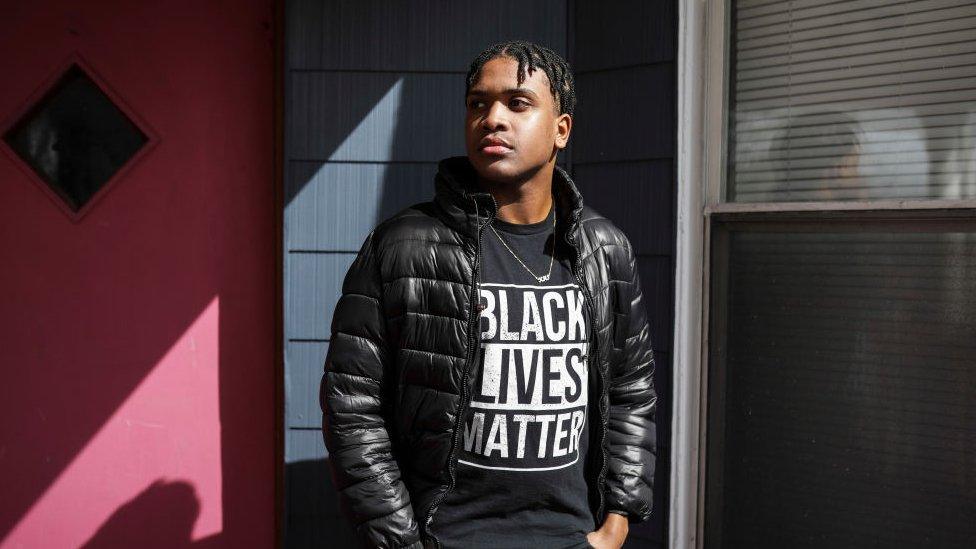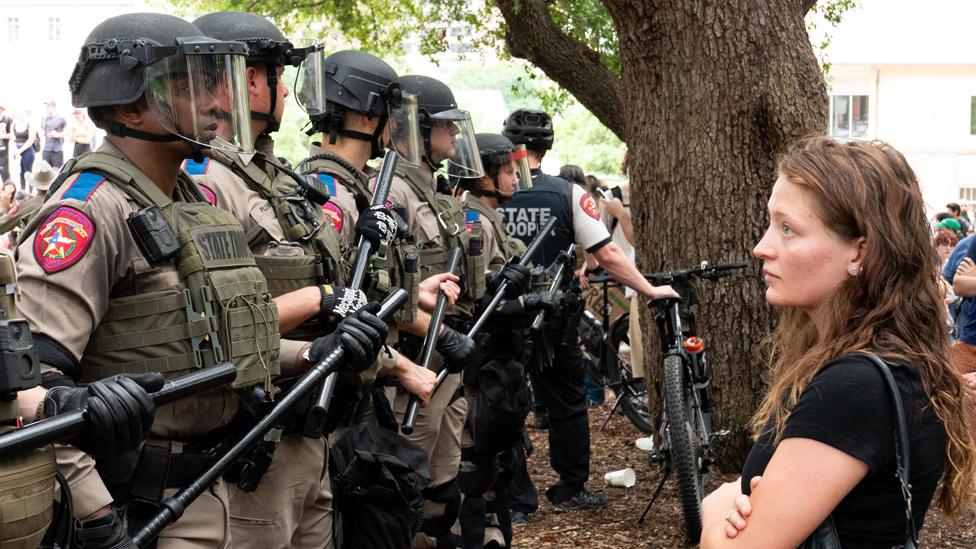Columbia campus protester apologises for 'kill Zionists' comments
- Published

Khymani James, shown in this photo from 2021, apologised for the comments
A leader of students protesting the war in Gaza at Columbia University has apologised after video emerged of him saying "Zionists don't deserve to live".
Khymani James, 20, said he was "unusually upset" and "misspoke in the heat of the moment".
On Friday, Columbia announced that he had been banned from campus.
Protests which began at Columbia in New York City have since spread to campuses across the US.
Mr James, who has acted as a spokesman for the protesters, posted the comments to Instagram in January. He also said: "Be grateful that I'm not just going out and murdering Zionists."
The comments were made both before and after Columbia administrators called him in for a disciplinary hearing.
"I don't fight to injure or for there to be a winner or a loser, I fight to kill," he said in a post.
In recent days, those comments were circulated by pro-Israel activists.
On Friday Mr James apologised, writing in a statement on X: "I affirm the sanctity of all life and the movement for liberation."
"All people deserve to be safe from physical harm."
"Calls of violence and statements targeted at individuals based on their religious, ethnic, or national identity are unacceptable and violate university policy," the university said in a statement.
A spokesman for the White House issued a statement condemning his remarks about Zionists.
"These dangerous, appalling statements turn the stomach and should serve as a wakeup call," White House spokesman Andrew Bates said in a statement.
"It is hideous to advocate for the murder of Jews."
Some of the campus protests on US campuses have been accused of antisemitism, and President Biden earlier this week condemned the "antisemitic protests".
A number of Jewish students have said they have felt unsafe at Columbia and at other universities, although other Jewish students have joined the demonstrations.
On Friday, the Columbia University Senate, made up of faculty and students, voted to admonish the university administration for its handling of the protests.
Calling city police in to clear the encampment ran "contrary to the norms and traditions" of the university, the senate said.
Columbia President Nemat "Minouche" Shafik is facing pressure to step down over the response to the protests.
The latest wave of campus protests began after Columbia officials called in police to clear a protest encampment on 18 April and more than 100 people were arrested.
Watch: See how Gaza campus protests spread across the US
Activists have been calling for universities to "divest from genocide" and to stop investing large school endowments in companies involved in weapons manufacturing and other industries supporting Israel's war in Gaza.
Israel is currently facing a case brought by South Africa at the International Court of Justice alleging that it is committing genocide against the Palestinians, an accusation Israel has rejected as "baseless".
Among the recent developments:
Officials at Ohio State University admitted that armed police with scopes were present overlooking protests in Columbus after photos spread of snipers on rooftops. A total of 36 protesters - a mix of students and non-students - were arrested Thursday night
Criminal charges were dropped against protesters arrested at the University of Texas at Austin earlier in the week. Travis County Attorney Delia Garza said the cases "lack sufficient probable cause to proceed"
Several faculty members were arrested during chaotic scenes at Emory University in Atlanta on Thursday
Protest camps are ongoing at University of California, Berkeley, the University of Michigan, Northwestern University near Chicago and others across the country
The war began when Hamas-led gunmen carried out an unprecedented attack on southern Israel on 7 October, killing about 1,200 people, mostly civilians, and taking 253 others back to Gaza as hostages.
More than 34,180 people - most of them children and women - have been killed in Gaza since then, the territory's Hamas-run health ministry says.

Are you a student in the US? Please share your experiences by emailing haveyoursay@bbc.co.uk, external.
Please include a contact number if you are willing to speak to a BBC journalist. You can also get in touch in the following ways:
WhatsApp: +44 7756 165803
Tweet: @BBC_HaveYourSay, external
Please read our terms & conditions and privacy policy
If you are reading this page and can't see the form you will need to visit the mobile version of the BBC website to submit your question or comment or you can email us at HaveYourSay@bbc.co.uk, external. Please include your name, age and location with any submission.
Related topics
- Published26 April 2024
